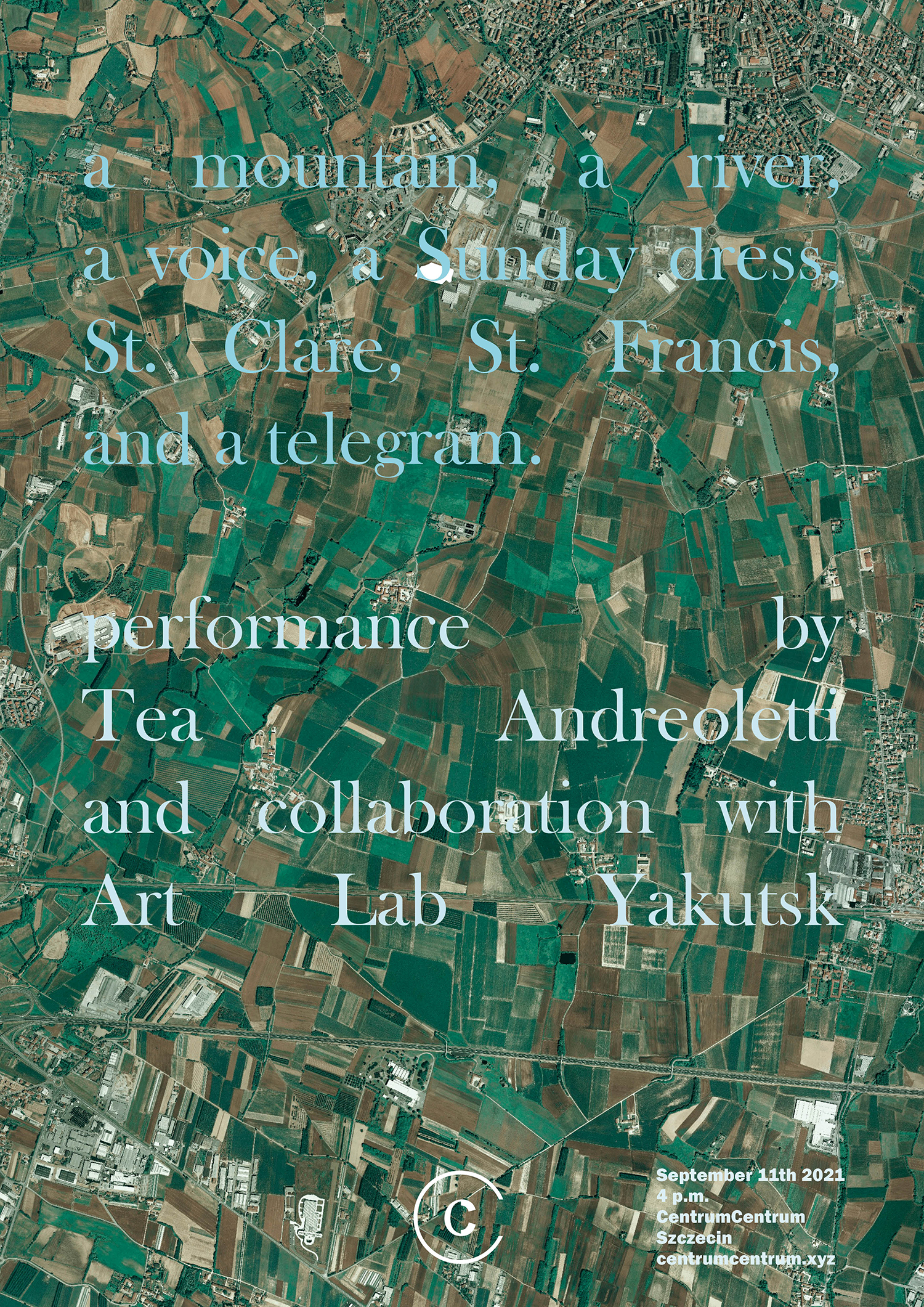
Tea Andreoletti, "Disanthropic Action". Satellite view of the Poirino plateau, municipality of Chieri (IT).
A production by IperPianalto project, Spinola Banna per l'Arte Foundation, 2018.

11.09.2021
16:00 (4 p.m.)
|
I Once upon a time in Northern Italy, there was a piece of land 10 by 50 meters. Plants, since they were purposely not cut there, could grow there as they wished. And so they did. Surrounded by fields of monocultures and industrial plots, that piece of land seemed to be like a mirage. From aerial perspective one could easily see the borders between parcels of land. It was cut into geometric shapes, each accounted in the local government archives as possesion of particular human citizen or (corpo)ration. From 2018 to 2108, this patch of land donated by local government to the artist Tea Andreoletti, was deliberately not used by humans. II
Tea Andreoletti does not document
her projects in photos or videos. She uses a spoken word to disseminate and
preserve her projects in a form of subjective
stories that, like gossips, can easily be changed or forgotten. III
The concept
of private property, is the key protagonist of the event at CentrumCentrum. In
the second part of the evening, the participants will hear an excerpt from a
diary of M.K., a geologist living in the far Siberia, in Yakutia. Siberian
land is not as much cut into various geometrical forms, which (like in
Northern Italy) are owned by many different entities (individuals or
corporations). Yakutia is a vast and harsh land of forrests, rivers, swamps,
occasionally enriched with human buildings, roads, train tracks. Here, the
private or state properties are not as easily visible from satellite as in Western
Europe. What is more the lands of Siberia, like the lands in the Amazon, or
Northern America, used to be occupied by non-european tribes, before it was
collonized by white settlers. Those tribes did not establish the relations with
the land by the juridical concepts of private property, stamped with immaterial
contracts, but on the idea of belonging to the earth/land/soil. The
excerpt from M.K. diary and the installation titled „Telegram” that
accompanies it (both presented in CentrumCentrum) were realized by
CentrumCentrum by the invitation of Art Lab Y... This obscure collective is
working, since the beginning of summer 2021, on M. K. diary, that will be
composed from various memories, assumptions, ambitions, point of views written
by different collectives, institutions (invited for the project) from various
lands. Her recollections will resemble a satellite photograph of Northern
Italy, which represents land cut into many geometric forms, each belonging to
somebody else.
|
Dawno, dawno
temu w północnych Włoszech znajdował się kawałek ziemi II
Tea Andreoletti nie dokumentuje swoich projektów artystycznych za pomocą
fotografii czy video. Używa słowa mówionego, aby rozpowszechniać i utrwalać
swoje działania jako subiektywne opowieści, które podobnie jak plotki można
łatwo zmienić lub zapomnieć. III Koncepcja własności prywatnej jest kluczowym bohaterem wydarzenia Fragment pamiętnika M.K. oraz towarzysząca mu instalacja „Telegram” (obie prezentowane w CentrumCentrum) zostały zrealizowane przez CentrumCentrum na zaproszenie Art Lab Y... Ten tajemniczy kolektyw pracuje od początku lata 2021 roku nad pamiętnikiem M.K., złożonym ze wspomnień, założeń, ambicji i punktów widzenia wielu różnych (zaproszonych do projektu) kolektywów i instytucji z różnych krajów. Jej wspomnienia będą przypominać satelitarną fotografię północnych Włoch, przedstawiającą ziemię pociętą w różne geometryczne formy, z których każda należy do kogoś innego.
|
















